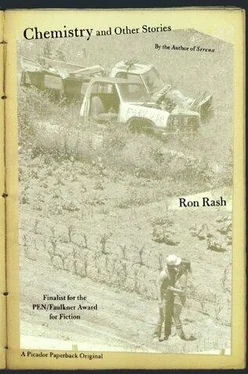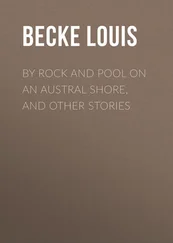“Do you remember me?” she asked.
He nodded. His neck quivered, a quick gulping of air into the esophagus, then a low, harsh burp of words.
“Why are you here?”
“I wanted to see you, to see how you were getting along.”
He swallowed.
“Now you’ve seen me.”
Anna did not move.
“What else do you want?” Josh Triplett said.
Anna wanted to tell him what she felt the night Jonathon, who’d never been in a war, asked “Why can’t you just be happy, happy that a bad time in your life is over with?” Anna wanted to tell Josh Triplett she once believed that after a while the world would return to what it was before Korea, that time could fade what she’d seen the same way it faded a photograph left out in light. She wanted to tell him that she’d once saved his life and now she needed him to help save hers.
“I have dreams,” she finally said. “Dreams about the men I saw die.”
He spoke, each clot of words followed by a quick swallow.
“I have dreams too, I dream of before, when I had two arms, when people didn’t, look away when I spoke.” He pulled a handkerchief from his pocket, wiped spittle from the stoma.
“But you’re not dead,” she said, her voice quivering.
“Sometimes I wonder if I really am alive,” he said.
“You’re alive,” she said.
“Then maybe I shouldn’t be.”
Anna leaned against the trailer, tried to blink away the tears as Josh Triplett looked down at her, his gray eyes unblinking as a hawk’s.
“You saved my life,” he said. “I know that. Maybe I’ll be glad you did. Someday.”
His words passed over her like cloud shadow, a cloud whose color is unknown. There was no inflection to tell if his words were sarcastic or compassionate.
AS ANNA WALKED out of the hollow she remembered the note left on the bed the day Jonathon left.
“I want a future,” the note said.
Mrs. Triplett waited on the porch.
“Come inside and warm up,” she said.
Anna was too weary to say no, so she stepped onto the porch and followed Mrs. Triplett into the front room, whose only light came from the fireplace. The old woman dragged a ladder-back chair in front of the fire and led her to it, then disappeared into the back of the house. She brought back a tin cup filled with coffee.
“Drink this,” Mrs. Triplett said.
Anna shivered so violently she held the cup with both hands, afraid to raise it to her face lest she spill it. The cup warmed her palms as she closed her eyes, leaned her face toward the fire and let it bathe her in its heat. The old woman stood close by, saying nothing. When Anna quit shaking she brought the cup to her mouth, her eyes still closed, imagining the coffee a warm glow as it moved down her throat into her belly. She sipped and listened to the crackle of the fire, the ticking of the clock on the mantelpiece. Warm now, she leaned back in the chair and for a few minutes slept without dreaming as the fire’s heat covered her like a quilt.
The clock chimed five times and Anna opened her eyes. The cup was still in her hands, but all that remained were a few grounds sloshing the bottom.
“You want more?”
“No, no thank you,” Anna said. “I’ve got to be going.”
“How far you got to go?”
“Washington,” she said.
“You could spend the night here. I’ve got an extra bed.”
“No, I need to go,” Anna said, getting up from the chair.
The old woman looked into the fire, her palms held out to its warmth.
“My sister’s son, he got polio when he was eight. Somehow they got through that. My brother, he fought the Japanese during the World War. He come back home and you’d not know he’d left. He went back to farming and got on with his life. It made me believe people could endure about anything. I don’t know that to be true anymore.”
“I don’t either,” Anna said.
“Some grief is like barbed wire that’s been wrapped around a tree,” Mrs. Triplett said. “The longer it’s there the deeper the barbs go, the closer to the tree’s heart.”
Mrs. Triplett took the cup from Anna’s hand, placed it on the mantel.
“It’s kind of you to come,” she said. “I should have been friendlier when you first showed up. What’s happened to Josh, it’s done made me bitter.”
“I understand,” Anna said.
“Do you have children?”
“No.”
“That’s a shame,” Mrs. Triplett said, her hands held again to the fire. “You have a good heart. You’d be a good mother.”
Anna shook her head.
“No, I wouldn’t be.”
Anna turned and walked on out to her car. Through the windshield she saw Mrs. Triplett’s face in a window. The old woman raised a hand in front of her weathered face, her palm open as if offering a blessing.
Anna backed out of the driveway and started down the mountain toward Boone, the sun already sunk behind the mountains. She would drive as far as she could. When the road began to blur and she was too tired to go on, she would stop at a motel.
By then she would have crossed the Virginia line, driven through Pulaski and Roanoke and Lynchburg, the land leveling out as she skirted the lower Shenandoah Valley. Somewhere among the old killing fields between Appomattox and Manassas she would find a crossroads or hamlet with a name drenched in history. She’d be too exhausted to eat or take a shower. She would take off her shoes, blouse, and skirt and slip on her nightgown. Anna would turn on the bathroom light and pull back the covers, close her eyes and remember the warmth of fire and coffee as she lay down again with the dead.
Imet Lee Ann McIntyre on a date suggested by my wife. Kelly always read the personals as she drank her morning coffee. “Better than the comics,” she said and would read aloud the ads she found most amusing.
“Why not an article about what it’s like to meet your soul partner through a newspaper ad,” she said one June morning as we sat at the kitchen table. “You go out on the date and write about it. That could be amusing.”
“I don’t think so,” I replied.
I looked out the wide bay window where our cat stalked a chipmunk.
“I think it’s a very good idea,” Kelly said, and trailing her words like a shadow was the fact that my book The Myth of Robert Frost was stillborn at thirty-eight pages. I looked at her, dressed administratively in her dark blue blazer and skirt while I was barefoot, clothed in jeans and a T-shirt. Unlike me, she had somewhere to go, something to do.
“I’ve even got a woman picked out for you,” she said, holding up the paper between us. “Let’s deconstruct this, darling. ‘Hopelessly Lonely.’ Now would that be the signifier or the signified? No matter. ‘DWF, 32, brown/green, 5–6, 140.’ No mention of whether she still has any teeth. ‘Likes mountains, quiet evenings, and reading.’ See, you all are a perfect match, though you better bone up on Harlequin romances. ‘Seeks WM, 25–40.’ What did I tell you? That’s you exactly, it’s fate. ‘A knight in shining armor.’ We’ll have to work on that. ‘Who likes children.’ You like children, don’t you? How about three or four. This woman probably has them. ‘And understands the hardships of life.’ You understand the hardships of life, don’t you?”
Kelly took a pen from her briefcase.
“Here,” she said, circling the ad. “Call Carolina Tempo. I guarantee they’ll go for this idea. Then call Hopelessly Lonely. Leave a message that you want to take her to dinner at the Grey Pheasant. Tell her knights in shining armor don’t take their dates to Wendy’s or the Waffle House. That will put you ahead of the rest of the guys who call.”
Читать дальше












